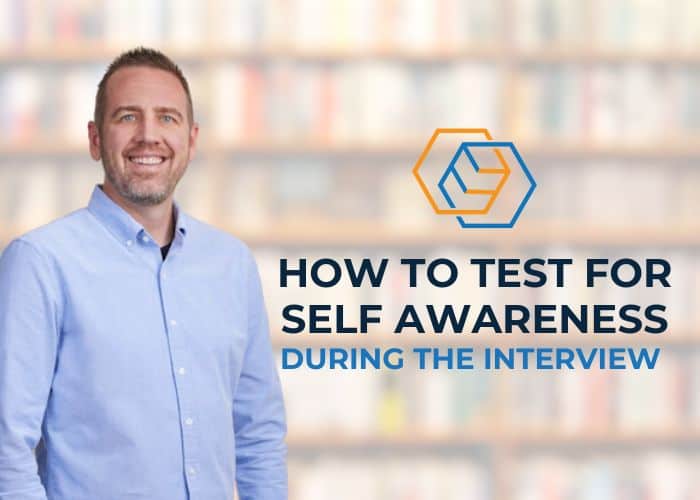How to Test for Self Awareness During the Interview

Self awareness is one of the latest buzzwords in business. And with good reason. Research suggests that the more self aware someone is, the more productive and happier they will be.
But in order to test for self awareness during the interview, you have to possess the traits yourself. While you might be thinking you’re very self aware, odds are, you’re wrong.
According to a study by the Harvard Business Review, most people believe they’re self aware, however in reality only 10-15% of the people studied actually fit the criteria. While most of us are not entirely self aware, many people have some of the traits that they can use during the interview and on the job.
Defining Self Awareness
So, what is self awareness?
According to a recent article, “self awareness is the ability to focus on yourself and how your actions, thoughts, or emotions do or don’t align with your internal standards.”
People who are self aware:
- Objectively evaluate themself
- Reflect on their actions
- Manage their emotions
- Align their behavior and values
- Understand how others perceive them
Employers who are self aware are always:
- Monitoring
- Regulating
- Evaluating
By taking the time to improve these skills, both with leadership and with your team, your company will become a better place to work.
Interview Questions to Test for Self Awareness
When interviewing, you want to consider how self aware a candidate is. Someone who lacks this skill will likely coast through their days without much care for how their actions and behaviors impact the team or the company.
To test for this, pay close attention to a candidate’s answers during the interview.
Vague answers lack awareness. Specific answers with examples and a plan to improve or adapt are coming from someone who is more self aware.
Sample Questions to Test for Self Awareness
- Who is your ideal manager?
- Describe a time you let your team down.
- How does your current role impact your employer’s profitability?
- Describe a time you improved productivity in your role or for your team.
- Which is more important – profitability or productivity? Why?
- Tell us about a time you had to correct a team member’s performance.
- How do you approach a conversation when you disagree with your supervisor?
- How have you changed as a team member since your first job?
- Describe the type of team member you prefer working with.
- Describe the type of team member that makes your job harder.
- If you could learn anything, related to the job or not, what would it be and why?
- If you were leading a project and had to choose between going over budget or missing the deadline, what would you choose? Explain your logic.
- What steps do you take to fit in with the team when you start a new job?
- What type of work environment makes you the most productive?
Questions like these uncover how much thought a candidate has put into what makes them succeed at work. They create the opportunity for a conversation to reflect on previous actions, their impact on the team or company, and give the candidate an opportunity to show self awareness by describing how they’ve changed or would do things differently since the situation.
Leaders With Self Awareness
Lack of self awareness in leadership positions has a huge negative impact on team morale, productivity, and profitability. It often shows up in small ways as warning signs.
Picture a supervisor who treats his crew to lunch after a particularly grueling morning on the jobsite. Someone on the crew picks a new restaurant in town. Everyone seems to be enjoying their meals when the supervisor blurts out, “This food is disgusting!” The conversation instantly stops and the crew nervously looks around at everyone’s nearly empty plates.
Suddenly there’s a disconnect between the supervisor and the crew. He’s made his entire crew feel uncomfortable and alienated the person who picked the restaurant. While the comment may seem insignificant, it often shows up in bigger ways – how ideas are pitched, how people are supported, and so on.
By understanding how you’re perceived by other people and recognizing that your words and actions have an impact on the people around you, you can begin to lead with the team in mind.
How to Improve Self Awareness
We already know that the majority of people who think they’re self aware actually aren’t, so what are some steps you can take to improve your awareness?
- Seek frequent feedback from your team, supervisor, leadership, etc.
- Reflect on your behaviors and how the people around you respond
- Ask yourself why you did or said something
The good news is that increasing your self awareness, even just a little bit, will make a dramatic difference in the way you interact with your team. This will lead to higher morale, greater productivity, and even better retention rates.
The Value of Self Awareness
Self awareness leads to higher job satisfaction, personal growth, and happiness. It also leads to:
- Better communication
- Better decision making
- More effective leadership
Interviewing to test for self awareness has immediate and long term benefits. In addition to building a more effective team, you’ll avoid hiring someone who isn’t a good fit. From thoughtful conversations to vision-driven work, a self aware person functions on a different level.
If you already have a team in place who lacks self awareness, it’s not too late. They can develop greater awareness by learning about their strengths and weaknesses, reflecting on their decisions, and learning how to manage their emotions. Create a culture where people feel comfortable getting and giving feedback to strengthen the team.
If you’re ready to change the way you hire and implement a proven process to fill your pipeline with the right people, check out the Core Fit Hiring System today.



